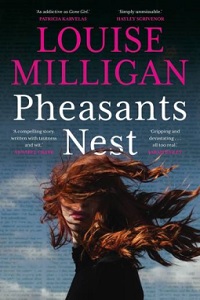Publisher's Synopsis
Kate Delaney has made the biggest mistake of her life. She picked the wrong guy to humiliate on a girls' night out and now she is living every woman's worst nightmare. Kate finds herself brutalised, bound and gagged in the back of a car being driven god knows where by a man whose name she doesn't know, and she is petrified about what's in store for her.
As a journalist who is haunted by the crimes she's had to report over her career, Kate is terrifyingly familiar with the statistics about women who go missing—and the fear and trauma behind the headlines. She knows only too well how those stories usually end.
Kate can only hope the police will find her before it's too late, but she's aware a random crime is hardest to solve. As the clock ticks down, she tries to keep herself sane by thinking about her beloved boyfriend and friends, escaping into memories of love and happy times together. She knows she cannot give way to despair.
As the suspense escalates, Kate's boyfriend Liam is left behind, struggling with his shock, fear and desperation as the police establish a major investigation. The detectives face their own feelings of anguish and futility as they reflect on the cases they didn't solve in time and the victims they couldn't save. They know Kate's chances of survival diminish with every passing hour.
My Review of Pheasants Nest by Louise Milligan
Pheasants Nest is the debut crime thriller by former ABC journalist Louise Milligan and it captures the despair and regret felt by a kidnapping hostage as the raw wave of emotions starts to roll. This character driven drama spans a matter of days and taps into the darker realms of sexual violence by men against women.
Kate Delaney was on a girls night out in Melbourne when she’s drugged, abducted and driven towards Sydney. It’s as she reaches the notorious Belanglo National Forest and then the Pheasants Nest bridge that she begins to ponder about just how serious her situation actually is. And it’s around this part of New South Wales where her life is put at risk.
Her boyfriend, Liam Carroll, is back in Melbourne wondering why Kate isn’t answering her phone or texting him as she normally would. In a panic he calls the police to report her absence, regressing into a blithering idiot as he finds himself blathering on, breathlessly trying to tell them everything he can think of about her all at once. The result: he immediately goes on to their radar as a ‘person of interest’.
Following the initial shock of the abduction, the story settles into a more subdued pace as the focus alternates between Kate and her abductor and Liam and Sylvia, with a great deal of introspection and past memories dominating. This gives us great insight into each of the three main characters, providing us with a rich background that ensures they become full, well developed people. Naturally, this ensured that I had a stake in the outcome of the plight that Kate was in.
The problem I had with the story was that after a promising beginning the early momentum was lost and the story just tended to drift. There was no real build up of tension with the abductor making one ridiculous decision after another, but never really striking me as directly threatening towards Kate. To make matters worse, it felt as though the local police were being portrayed in a humorous way, yet the humour just missed the mark.
Strangely, the times we were focusing on the abductor were the most surreal parts of the story. For someone who should have been such a large part of the story, he’s still a virtual unknown so it’s difficult to perceive him as a real threat. He remained unnamed throughout the book, referred to simply as “the Guy”, which took a great deal of the sting out of him.
This is a book that could very well have been a tense thriller, but for much of it the mood was remarkably light and too much of the focus was on the good times of the past rather than the plight of the present. Sure, things pick up right towards the end as the denouement takes place, aided in large part by a remarkable coincidence, but it all felt too little, too late.

